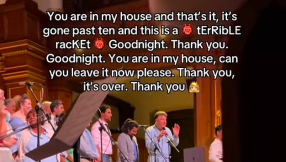
Jewish academic and Hebrew scholar Irene Lancaster reflects on the Fast of Av, known as the saddest day in the Jewish calendar, and explains how in the place of mourning and despair, pockets of hope appeared.
This is an abridged version of the talk I'll give today at Shul for Tisha B'Av, the Fast of Av.
Tisha B'Av is about the destruction of Jerusalem, twice, and how we, the Jewish people, feel about it.
Let's start off then with a quote from the Jerusalemite, Rabbi Shear Yashuv Cohen, son of the Nazir of Jerusalem, who was at one time Deputy Mayor of Jerusalem. Later, he became the State of Israel's international representative on Jerusalem.
In the English-language version of his biography, he gives us his views on his beloved Jerusalem, which may come as a surprise to those of us brought up in the pacific West:
'I profoundly love this city. I love her because she is a city of contradictions and conflicts. I love her for her twists and turns, her hopes and despairs, her yearnings and agonies, her ups and downs. I love her for her fallings-out and patchings-up. I love her as do all her banim and bonim (her children and builders), every single one of whom cleaves to her totally. For, in the midst of the squabbling, the in-fighting and the dissent, one thing unites all Jerusalemites; their unique love of Jerusalem, a love like no others: 'Seek the peace of Jerusalem; may they prosper that love thee' (Psalms 122:6) (Rabbi Shear Yashuv Cohen: pp 227-229, translated by Dr Irene Lancaster).
So, the peace of Jerusalem which we all pray for and which is contained in her name, 'City of Peace', comes to us despite, or maybe even because of, all her conflicts, agonies, and ups and downs. This seems counter-intuitive in the Western world. But it is 'their unique love of Jerusalem' that saves the people in the end.
However, Talmud Yoma (9b) states that the First Temple was destroyed - in 586 BCE - because of the three cardinal Jewish sins of idolatry, immorality and bloodshed. The Second Temple was destroyed - in 70 CE - because of sinat chinam (causeless or purposeless hatred). This is despite the Jews of this era studying Torah, performing mitzvot (commandments) and practising kind deeds.
What a contradiction! How can the Jewish community, from around 960 BCE (when Solomon finished building the First Temple) up until 586 BCE, manage to bring sacrifices to the Temple, as prescribed by G-d, and yet succumb to the three cardinal Jewish sins?
And how can they, from the rebuilding of the Second Temple, in around 515 BCE, spend another 400 years seemingly behaving like 'good Jews' in every way, and yet succumb to causeless and purposeless hatred that, in the end, destroyed the Second Temple, and led to our exile from Jerusalem for 2,000 years?
Maybe one answer lies with the prophet Micah, which we read recently as the Haftorah to accompany Parshat Balak. Here, Micah, who lived in the 8th century BCE, enunciates G-d's basic requirements of us: 'to do justice, love kind deeds and walk unobtrusively with G-d' (Micah 6:8). This third requirement is a counter to causeless and purposeless hatred. Walking unobtrusively with G-d is a very difficult requirement.
Maybe what is needed is kavannah (right intention). Otherwise, we remain children of habit, carrying out rote behaviours, which may, if we aren't careful, lead to arrogance.
Historically, therefore, the chinks in the armour were already there. Worship of idols led to immorality which, when repeated often enough, became a mitzvah in the eyes of the people. What was wrong therefore became 'right'.
During the following 400 years, known as 'The Second Temple Period' and also as 'the 400 silent years', the Divine Presence of G-d, known as the Shekhina, was no longer present. And, at the same time, there was no more prophecy, the last prophet being Malachi, who ended his mission in around 430 BCE.
The people were united in bringing sacrifices to the Temple, to the same place, at the same time and to the same priests from the House of Levi. However, because of their bickering and hatred, they lost divine protection and ultimate unity. Finally, in 70 CE, they also lost their Land and the very Temple which had brought them together. Instead, they began a 2,000-year Exile amid an orgy of Roman barbarity.
Could despair get any worse? But the Midrash give us hope. For, 'From the moment the Temple was destroyed, the Messiah was born.' Yes, according to Jewish rabbinic teaching, the Messiah was born on Tisha B'Av, the Fast of Av, which we, the Jewish people, are commemorating today. And when he arrives, according to Jewish teaching, Tisha B'Av will no longer be mournful, but 'the gladdest of festive days.'
Midrash Bereshit Rabba (2:5) comments that, 'The spirit of G-d brooding and hovering over the face of the waters [Genesis 1:2] was the spirit of the Messiah.' The spirit of Messiah was already there in potential before the rest of the world was created, waiting for the right time to appear. This would be when things couldn't get any worse, i.e. on Tisha B'Av itself. The greater the tragedy, the greater the future rejoicing.
The prophet Amos, a contemporary of Micah, also bringing hope, writes in his own kinah (Lamentation): 'She has fallen. No more. Rise, virgin of Israel.' (Amos 5:2).
I have translated absolutely literally from the Hebrew. However, the passage is usually translated as 'She has fallen, the virgin of Israel. No more shall she rise.' But the first version, cited in Talmud Berachot 4(b), is grammatically correct, and has the added advantage of hope. In addition, on 'rising', Jerusalem has morphed from being 'feminine' to assuming the 'masculine' mode i.e. renewed strength.
Those who find this, more hopeful, interpretation overblown, may recall the 2003 best seller by Lynne Truss: Eats, Shoots & Leaves: The Zero Tolerance Approach to Punctuation, where a mere comma makes all the difference! Quite right. And in Biblical Hebrew, devoid of punctuation, attention to word order, gender and common sense, are all of paramount importance.
So, with support from the prophets, midrash and Talmud, let's now approach the Book of Eicha (Lamentations) itself, which we read today. This Book was written by the prophet Jeremiah (650-570 BCE), assisted by his scribe, Baruch. Jeremiah went into Exile with his people to Babylon after the destruction of the First Temple by the Babylonians in 586 BCE.
Eicha is divided into five chapters of seemingly unrelenting misery. However, suddenly, in the middle of the central chapter, the tone changes. Let's analyse some of the Book of Eicha, chapter 3 (20-41).
This section starts: 'My soul remembers well and makes me despondent. Yet this is how I respond to my heart. Therefore I still hope.' Further on, 'I have hope in Him [G-d]'. Here, the word for hope - 'ochil' - is related to the pangs of childbirth, the bringing forth of children through the birth canal - the end of the tunnel - therefore from the unknown of the dark into the unknown of the light. The same Hebrew word is also related to the word for 'beginning' - 'techila', also a girls' name!
However, the more common word for 'hope' in Hebrew comes from the root implying the expectant wait in a straight line - therefore depicting patience. Think queuing in this country. It is also the title of Israel's national anthem, 'Ha Tikvah'. Eichah continues: 'The Lord is good to those who hope/wait patiently ...'
This patient hope is in contrast to the writhing hope conveyed by the earlier meaning. But both are necessary. This writhing hope is depicted as 'silent' [dunam]. 'Let one sit in solitude and silence for He has laid it upon him. Let him even put his mouth to the dust - there may yet be hope [tikvah]. Let one even offer his cheek to the smiter - let him be filled with disgrace.'
Here we find the origins of the practice of 'turning the other cheek', which is itself based in Isaiah 50:6: 'I gave my back to the smiters, my cheeks to those who plucked off the hair.' This passage is read in Shul as part of Haftorat- Ekev, one of the Haftorot of Comfort, which takes place soon on August 16. How often have the Jewish people experienced this type of degrading behaviour by their sworn enemies, not least the hostages currently incarcerated by Hamas in Gaza.
In verse 31, there truly appears to be light at the end of the tunnel: 'For the Lord doesn't reject forever. First he afflicts and then He has pity according to His abundant kindness. For [unlike man or pagan gods], the Lord does not torment on a whim from His heart, nor does He afflict humankind ... nor crush mere mortals and earth-bound people underfoot....'
We shall find the answer to our questions by 'searching and examining our ways and then returning right up to the Lord. Let us lift our hearts with the palms of our hands up to heaven....'
We should return not merely 'to G-d', but strive to reach right up to Him. Talmud Yoma 8(b) states: 'Great is teshuvah [return/repentance], for it reaches right up to the Throne of Glory.'
Two conclusions: the 'answer' ('anah) itself comes from within the 'torment' ('inah). Answer and affliction stem from the very same root. But finally, 'lifting our hands in prayer' is not enough. Rote habit is not enough. We have to do this in tandem with our hearts. This explains how rote Torah study, mitzvot and kind deeds can lead to 'causeless and purposeful hatred', culminating in the destruction of the Second Temple. Rote behaviour is not enough. The question is: Do we put ourselves out enough for others?
And this is maybe what Micah also meant in Chapter 6:8, cited above. 'What does the Lord require of you? Nothing more or less than to do justice [not just study it]; love kindness [and practise it] and walk with G-d, but unobtrusively.'
And this is also the lesson of the earlier prophet Elijah [1 Kings 19: 11-13], which we sometimes read as part of Haftorah Pinchas. The kol dmmah dakah ('still small voice') is where G-d is to be found, in the still small voice of struggle which can lead to the culmination of our hope in resurrection and rebirth.
So let's end on a very uplifting note.
Exactly one week after the Six Day War, on June 14, 1967, the Jewish people, in a historically reunited Jerusalem, marched as one on a pilgrim celebration of Shavuot (Pentecost). They approached the Kotel, the Wall of the Temple which they hadn't been permitted to fully access under the British Mandate 1922-47), nor under the Jordanians (1948-67). However, now, at this moment, they were able to access the place of all their hopes and dreams of 2,000 years, as stated in the national anthem, Ha Tikvah.
The great, unforgettable Tzaddik of Jerusalem, Reb Aryeh Levin (1885-1969), who had visited condemned prisoners in their cells under the Mandate, and had moved heaven and earth to get their sentences commuted, bumped into the young Rabbi Shear Yashuv Cohen, who at that time served as Deputy Mayor of Jerusalem, with special focus on the unity of Jerusalem and her inhabitants.
They walked together on this auspicious occasion and Reb Aryeh whispered to Rabbi Shear Yashuv in Yiddish:
'My whole life I have not been able to understand what is meant by those words of Scripture: 'When the Lord accompanied the captivity of Zion on their return - we were like dreamers....[Psalms 126:1].' But now I understand.
'It is characteristic of a dream that in a single instant a person can see events that have actually taken place over a long period ...
'You actually see it in a single instance. In the twinkling of an eye the whole picture becomes clear to you. Through a dream moment you comprehend a whole era, a whole history, a whole story. In that very instant you experience the entire existence of generations past.
'This is exactly what is happening to us now. We are just about to enter the Old City, walking on foot to the Kotel. Are we not 'like dreamers'? At this very moment we are connected to the many millions of Jews who have prayed throughout the generations for what we are experiencing right now.
'We can see the long years of Galut [Exile], the Shoah, the Underground where I visited you and others in Latrun Prison, the War of Liberation and most recently, the Six-Day War. This very second, while you and I are walking together to the Kotel, everything is happening as in in a dream.
'Because, this is it! It is happening now! How fortunate we are to merit this moment, the moment of the rebirth of Israel the moment when Am Yisrael are once more in control of the City of Jerusalem. How fortunate we are to be worthy of reaching these times: the times of the beginning of the redemption. And if we all do Teshuva right now and repent, there is no doubt that redemption will soon be complete.'
So, the liberation of Jerusalem and of the Kotel, the Western Wall, was the culmination of 2,000 years of exile, persecution and death, together with the vision, dreams and hopes prayed for by many generations of Jews for 2,000 years, as encapsulated by the Psalmist's vision of the return of the captivity of Zion, accompanied by G-d Himself.
Today, in the face of everything thrown at us, the Jewish people, we should not forget that this is not new; it has been our fate for 2,000 years. But, with G-d's help, may we yet see miracles and experience the final redemption. May this Tisha B'Av turn out to be the last step on the way to the final redemption, when peace will be permanent and war will be a thing of the past.













